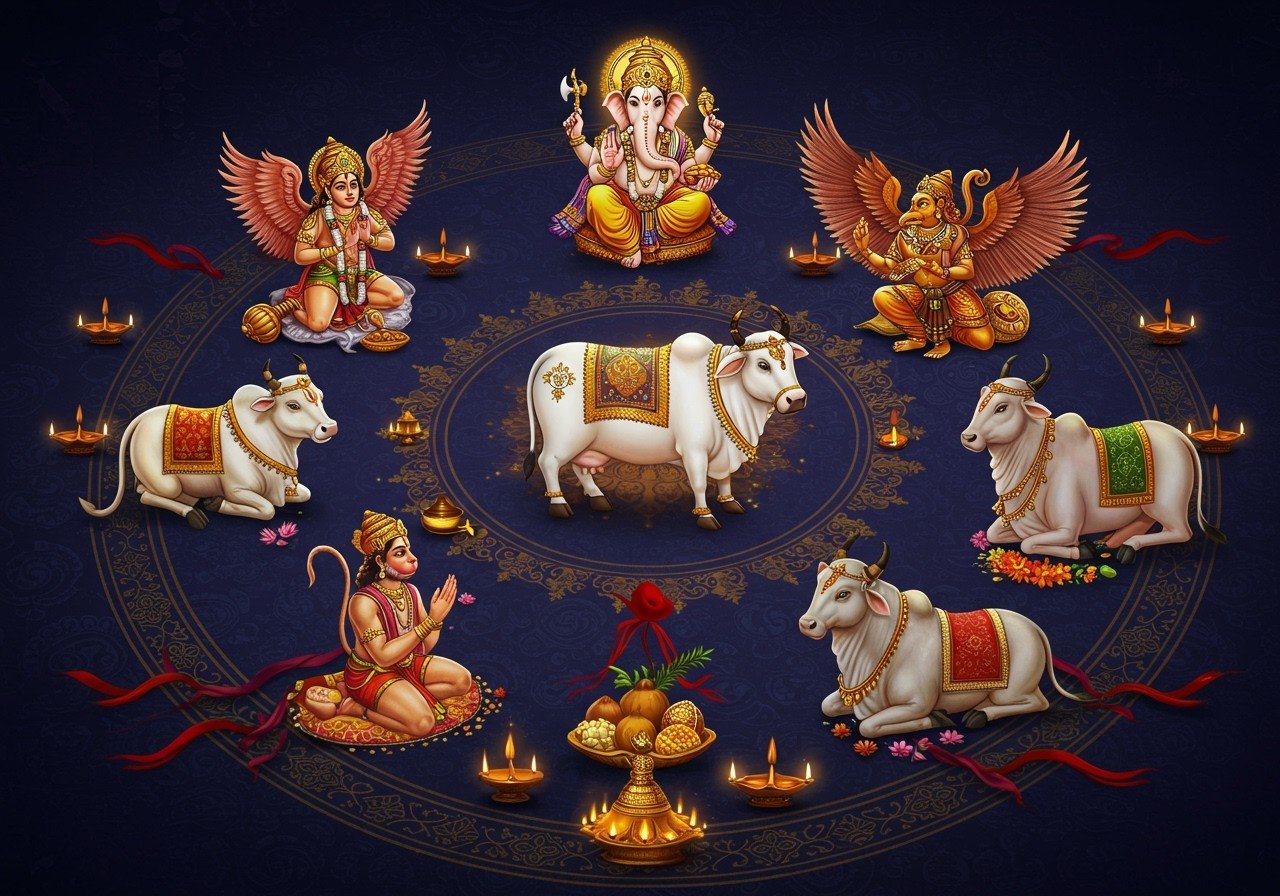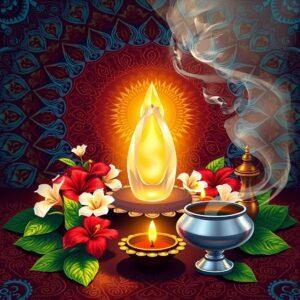
Animals hold a special place in Hinduism, deeply woven into its traditions and beliefs. They are seen as embodiments of divine qualities, symbolizing virtues and acting as vehicles for deities. Understanding these connections offers insights into Hindu spirituality and the harmonious relationship between humans and nature. This exploration is meaningful for those who value tradition and seek to understand these sacred links.
The Cow: Revered as a Symbol of Motherhood and Prosperity
The cow is highly revered in Hinduism, often associated with the goddess Kamadhenu, a divine cow that fulfills all wishes. It symbolizes motherhood, fertility, and selfless giving. Cows play a vital role in religious rituals and festivals like Gopastami and Govardhan Puja. Hindu texts emphasize ethical and moral duties to protect and honor cows. Lord Krishna, depicted as a cowherd, highlights the cow’s significance in his stories. In rural India, cows are crucial for economic prosperity. Philosophical teachings encourage seeing the divine in all life forms, with cows as prime examples.
The Cat: Mysterious Connections to Goddess Shashthi
Cats have a unique connection with the goddess Shashthi, known for fertility and childbirth. They symbolize protection and nurturing, reflecting the goddess’s qualities. In Hindu households, cats are considered auspicious, especially during childbirth. Folklore like the Panchatantra features cats in moral tales. Cats are valued for their independence and mystical presence in Hindu culture. They are seen as guardians in Hindu art and mythology. Respect for cats balances caution, acknowledging their dual nature.
The Dog: Loyalty and Guardianship in Hindu Mythology
Dogs symbolize loyalty and protection in Hinduism, linked to Bhairava, a form of Lord Shiva depicted with a dog. They represent vigilance and faithfulness in Hindu stories. In the Mahabharata, Yudhishthira’s journey to heaven with a faithful dog symbolizes dharma. Dogs are honored during Tihar in Nepal. Cultural practices view dogs as protectors and spiritual guides. Philosophical teachings highlight their role as loyal companions, embodying trust. In Hinduism, dogs are revered yet sometimes viewed with caution, reflecting life’s complexities.
Bull (Nandi): The Loyal Gatekeeper of Lord Shiva
In Hinduism, Nandi the bull stands as a powerful symbol of dharma, representing cosmic law and moral path. As Lord Shiva’s vehicle and gatekeeper, Nandi embodies stability, strength, and patience. He acts as a silent witness to prayers, exemplifying focus and devotion. Hindus honor Nandi for the qualities needed to approach Shiva, reflecting on the deeper virtues of life. You can learn more about Lord Shiva and his connection to Nandi in our blog post about Mata Kaushalya Temple.
Eagle (Garuda): Swift Messenger of Lord Vishnu
Garuda, the mighty eagle, serves as Lord Vishnu’s vehicle. It symbolizes speed, power, and bravery. In Hindu mythology, Garuda embodies the triumph of good over evil. His swift movements and protective nature inspire believers to embrace courage and righteousness. Garuda’s presence in stories and art reinforces the eternal battle between light and darkness. Explore more about Hindu mythology and deities in our blog post on Enchanting Tales of Lord Krishna.
Elephant: Majestic Symbol of Wisdom and Strength
Elephants carry a deep spiritual significance in Hinduism. They symbolize royalty, strength, and divinity. The elephant-headed god Ganesha is revered as the remover of obstacles and a patron of intellect. Elephants represent patience, memory, and endurance. Their majestic presence reminds devotees of wisdom and leadership qualities. For those interested in the Hindu calendar and auspicious dates, our blog post Understanding the Hindu Calendar provides further insights.
Lion: Embodiment of Courage and Divine Power
Lions hold a sacred place in Hindu symbolism, representing divine power and courage. Associated with Goddess Durga and Narasimha, lions stand for righteous action and disciplined strength. They embody controlled ferocity and royalty. Devotees admire the lion’s majestic presence, drawing inspiration from its will and courage.
Monkey: Devotion and Strength Through Hanuman
Monkeys, especially through the tales of Hanuman, embody devotion and loyalty. Hanuman’s unwavering faithfulness to Lord Rama teaches lessons of strength and humility. He symbolizes selfless service and the power of devotion. In Hindu narratives, monkeys remind believers of dedication and inner strength. Delve deeper into Ram Navami celebrations and traditions with our blog post on Ram Navami Celebration.
Mouse: The Humble Vahana of Lord Ganesha
The mouse, as Lord Ganesha’s vehicle, represents overcoming obstacles and humility. It teaches that size does not determine strength. The mouse symbolizes removing ego and embracing simplicity. As Ganesha’s companion, it inspires believers to tackle challenges with grace. If you are interested in yantras and yagyas, our blog post Yantras and Yagyas Explained provides valuable information.
Peacock: Beauty and Joy in Divine Symbolism
Peacocks serve as the vehicle for Kartikeya, symbolizing beauty and joy. Their vibrant feathers represent triumph over evil. Peacocks inspire believers to find joy in life’s colors while standing strong against negativity. Their graceful presence encourages harmony and celebration of beauty.
Snake (Naga): Guardians of Change and Rebirth
Snakes hold a dual role in Hinduism, representing change and danger. They symbolize the life cycle, protection, and fertility. Lord Shiva wearing a snake signifies control over fear and death. Snakes inspire believers to embrace transformation while respecting their power. Learn more about sacred Hindu plants and their significance in puja rituals in our blog post Sacred Hindu Plants.
Animals in Hinduism: A Tapestry of Sacred Symbolism
Animals in Hinduism offer profound lessons on virtues like strength, humility, devotion, and courage. They act as symbols bridging the earthly with the divine, encouraging harmony between humans and nature. Each creature carries a story, offering insights into spiritual truths that resonate with those seeking deeper understanding within tradition.
How Poojn.in Helps You Honor Sacred Animal Symbolism
Poojn.in offers authentic items to help you connect with the divine animal symbols in Hinduism:
- Nandi Statues: Get brass and marble Nandi (bull) idols, Lord Shiva’s sacred vehicle, representing strength and devotion. Explore our collection of Nandi statues available in various sizes and materials.
- Garuda Items: Find Garuda-themed items like brass lamps and figurines honoring Lord Vishnu’s eagle mount. Discover unique Garuda artifacts crafted with intricate detail and symbolism.
- Hanuman Worship Items: Access complete puja sets and idols for worshipping the mighty monkey god. Find everything you need for Hanuman puja, from incense to beautifully crafted idols.
- Ganesha with Mooshak: Choose from various Ganesha idols featuring his mouse vehicle, symbolizing wisdom. Our Ganesha idols come in various poses and sizes to suit your preference.
- Durga with Lion: Browse metal and stone sculptures of Goddess Durga with her lion mount. Find powerful depictions of Durga, the warrior goddess, riding her lion, symbolizing strength and protection.
All items on Poojn.in come with:
- Verified authenticity certificates
- Secure packaging for fragile items
- Pan-India delivery
- Expert guidance on proper installation
- Competitive pricing
Visit www.poojn.in to explore our complete collection of sacred animal-themed items for your puja needs. Our customer service team can help you select the most suitable items for your worship space. For those interested in learning more about Rudraksha and Tulsi, visit Rudraksha and Tulsi: Sacred Hindu Symbols Explained. If you prefer online puja bookings, check out Online Puja Bookings: Embrace Technology for Simple Rituals.
Embracing Lessons from Sacred Animals
In the rich tapestry of Hindu symbolism, animals hold a sacred place, each teaching us invaluable life lessons. Through their stories and roles, they connect us to divine principles and inspire us to embody virtues like strength, devotion, and humility. By understanding these sacred connections, we honor our traditions and deepen our spiritual journey. Animals remind us of the harmony between the earthly and the divine, encouraging us to live in balance with nature and the world around us. As we reflect on these teachings, we find guidance and inspiration, enriching our lives with wisdom and purpose.
FAQs on Hindu Animal Symbolism: Sacred Connections Explained
Cat represents which God in Hinduism?
In Hinduism, the cat is often associated with the goddess Shashthi. She is considered the protector of children and is sometimes depicted riding a cat.
What is the significance of the cow in Hinduism?
The cow is considered sacred in Hinduism and is associated with several deities, including Lord Krishna. It symbolizes non-violence, motherhood, and abundance.
Is there a God associated with dogs in Hinduism?
Yes, Bhairava, a fierce form of Lord Shiva, is often associated with dogs. In many temples, dogs are revered as his vehicle or companion.
Why are elephants important in Hindu symbolism?
Elephants are significant in Hinduism primarily because of Lord Ganesha, the elephant-headed god. Ganesha is the remover of obstacles and symbolizes wisdom and understanding.
What does the peacock symbolize in Hindu culture?
The peacock is associated with Saraswati, the goddess of wisdom, and is also the vehicle of Lord Murugan. It symbolizes beauty, grace, and knowledge.
How are snakes viewed in Hinduism?
Snakes are revered in Hinduism and are associated with Lord Shiva and Lord Vishnu. They symbolize fertility, rebirth, and the cycle of life and death.
Do monkeys have a special place in Hindu mythology?
Yes, monkeys are significant in Hindu mythology, mainly because of Hanuman, the monkey god. Hanuman represents strength, devotion, and loyalty.
Are there any birds that hold special significance in Hinduism?
Yes, the eagle, known as Garuda, is the vehicle of Lord Vishnu. It symbolizes speed, power, and the ability to overcome obstacles.


